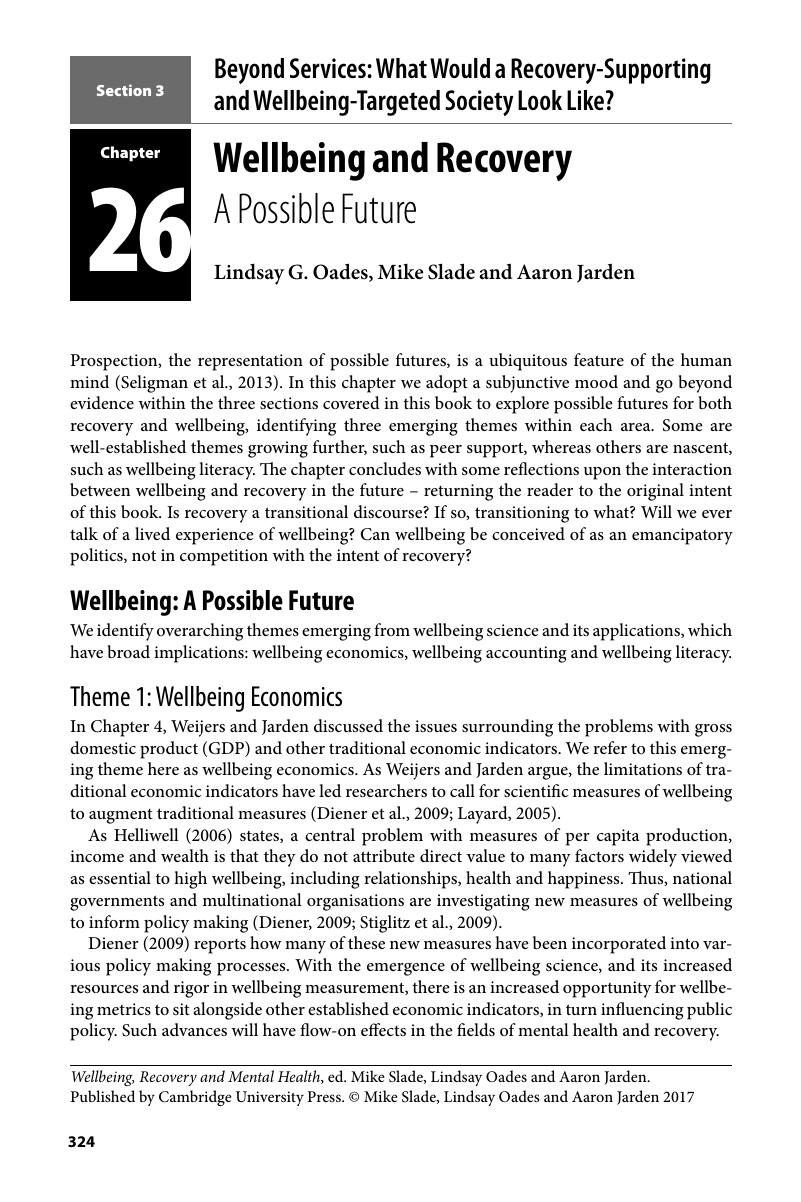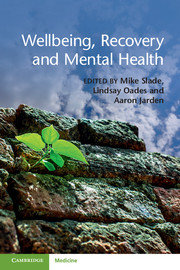Book contents
- Wellbeing, Recovery and Mental Health
- Wellbeing, Recovery and Mental Health
- Copyright page
- Contents
- Contributors
- Foreword
- Chapter 1 Why Wellbeing and Recovery?
- Section 1 Where Are We Now?
- Section 2 What Does a Wellbeing Orientation Mean in Mental Health Services?
- Section 3 Beyond Services: What Would a Recovery-Supporting and Wellbeing-Targeted Society Look Like?
- Chapter 17 Wellbeing Policy in Australia and New Zealand
- Chapter 18 Population Level
- Chapter 19 Community Level
- Chapter 20 Positive Education
- Chapter 21 Positive Tertiary Education in a Residential Setting
- Chapter 22 Living Well in Cities
- Chapter 23 Wellbeing-Enhancing Workplaces
- Chapter 24 Need-Supportive Parenting and Its Role in the Wellbeing and Recovery of Individuals
- Chapter 25 Social Marketing of Wellbeing
- Chapter 26 Wellbeing and Recovery
- Index
- References
Chapter 26 - Wellbeing and Recovery
A Possible Future
from Section 3 - Beyond Services: What Would a Recovery-Supporting and Wellbeing-Targeted Society Look Like?
Published online by Cambridge University Press: 31 March 2017
- Wellbeing, Recovery and Mental Health
- Wellbeing, Recovery and Mental Health
- Copyright page
- Contents
- Contributors
- Foreword
- Chapter 1 Why Wellbeing and Recovery?
- Section 1 Where Are We Now?
- Section 2 What Does a Wellbeing Orientation Mean in Mental Health Services?
- Section 3 Beyond Services: What Would a Recovery-Supporting and Wellbeing-Targeted Society Look Like?
- Chapter 17 Wellbeing Policy in Australia and New Zealand
- Chapter 18 Population Level
- Chapter 19 Community Level
- Chapter 20 Positive Education
- Chapter 21 Positive Tertiary Education in a Residential Setting
- Chapter 22 Living Well in Cities
- Chapter 23 Wellbeing-Enhancing Workplaces
- Chapter 24 Need-Supportive Parenting and Its Role in the Wellbeing and Recovery of Individuals
- Chapter 25 Social Marketing of Wellbeing
- Chapter 26 Wellbeing and Recovery
- Index
- References
Summary

- Type
- Chapter
- Information
- Wellbeing, Recovery and Mental Health , pp. 324 - 332Publisher: Cambridge University PressPrint publication year: 2017
References
- 4
- Cited by

